Comprehensive Guide to Garden Maintenance in Mill Hill
Introduction to Garden Maintenance
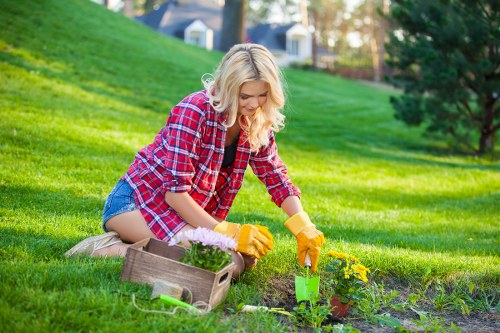
Maintaining a beautiful garden in Mill Hill requires a blend of knowledge, dedication, and the right resources. Whether you’re a seasoned gardener or a beginner, understanding the essentials of garden maintenance can help your outdoor space thrive throughout the year.
Garden maintenance encompasses a variety of tasks aimed at keeping your garden healthy, attractive, and functional. From regular pruning and weeding to seasonal planting and pest control, each activity plays a crucial role in the overall health of your garden.
In Mill Hill, the unique climate and soil conditions present both opportunities and challenges for gardeners. By tailoring your maintenance practices to the local environment, you can ensure your garden remains vibrant and resilient.
Seasonal Garden Maintenance
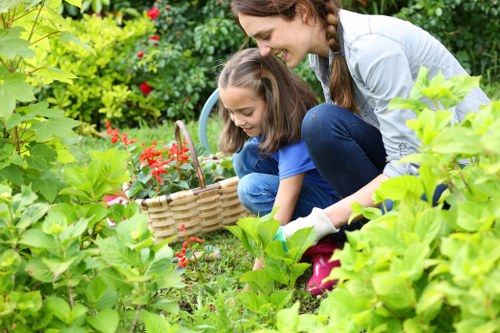
Different seasons bring different requirements for garden maintenance. Adapting your care routine to each season can significantly enhance the beauty and longevity of your garden.
Spring Maintenance
Spring is a critical time for garden maintenance. As the weather warms, it’s essential to prepare your garden for the growing season. This includes planting new flowers, trimming overgrown plants, and addressing any winter damage.
Key Spring Tasks
- Planting seasonal flowers and vegetables
- Pruning shrubs and trees
- Applying mulch to retain soil moisture
By focusing on these tasks, you set a strong foundation for a thriving garden throughout the warmer months.
Effective spring maintenance not only promotes healthy growth but also minimizes potential issues that can arise later in the year.
Tools and Equipment for Garden Maintenance
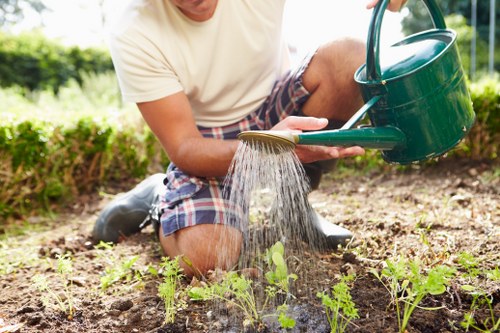
Having the right tools can make garden maintenance more efficient and enjoyable. Investing in quality equipment ensures that tasks are completed effectively, reducing the risk of plant damage and personal injury.
Essential Tools
- Pruners and shears: For trimming and shaping plants
- Garden gloves: Protect your hands from thorns and harsh elements
- Hoses and watering cans: Ensure your plants receive adequate moisture
These tools form the backbone of any garden maintenance routine, providing the necessary support for various gardening activities.
Regularly maintaining your tools, such as cleaning and sharpening, can extend their lifespan and maintain their effectiveness.
Pest and Weed Control
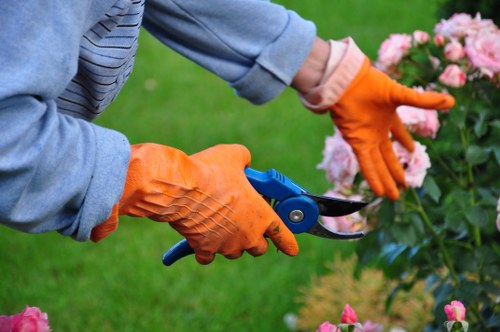
Managing pests and weeds is a fundamental aspect of garden maintenance. Uncontrolled pests and invasive weeds can severely impact the health and appearance of your garden.
Effective Pest Management
- Identify common garden pests in Mill Hill
- Implement organic or chemical control methods
- Encourage natural predators to keep pest populations in check
Adopting an integrated pest management approach helps maintain a balanced ecosystem within your garden.
Weed Prevention and Removal
Regular weeding is essential to prevent competition for nutrients and water. Mulching can be an effective strategy to suppress weed growth and retain soil moisture.
Consistent weed removal ensures that your desirable plants have ample space and resources to flourish.
Soil Health and Fertilization
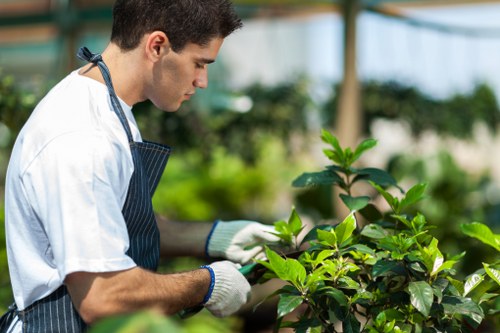
Healthy soil is the foundation of a thriving garden. Proper soil maintenance and fertilization provide the necessary nutrients for plant growth.
Soil Testing and Preparation
Conducting regular soil tests helps determine nutrient levels and pH balance. Based on the results, you can amend the soil to create an optimal environment for your plants.
Fertilization Techniques
- Using organic fertilizers to enrich the soil
- Applying compost to improve soil structure
- Implementing slow-release fertilizers for sustained nourishment
Proper fertilization supports robust plant development and enhances overall garden health.
Maintaining soil health is crucial for long-term garden sustainability.
Watering Strategies
Efficient watering practices are vital for garden maintenance. Proper irrigation ensures that plants receive adequate moisture without wastage.
Best Practices for Watering
Watering early in the morning reduces evaporation and allows plants to absorb moisture effectively. Additionally, using drip irrigation systems can provide targeted watering, minimizing water loss.
Water Conservation Tips
- Collecting rainwater for irrigation
- Using mulch to retain soil moisture
- Grouping plants with similar water needs together
Implementing these strategies not only benefits your garden but also contributes to environmental sustainability.
Optimizing your watering routine can lead to healthier plants and a more efficient garden maintenance process.
Pruning and Trimming
Regular pruning and trimming are essential for maintaining the shape and health of your plants. These practices help remove dead or diseased branches, promote airflow, and encourage new growth.
When and How to Prune
The timing and technique of pruning vary depending on the plant species. Understanding the specific needs of your plants ensures effective maintenance without causing harm.
Pruning Tools and Safety
- Using sharp, clean tools to make precise cuts
- Wearing protective gear to prevent injuries
- Disinfecting tools between uses to prevent disease spread
Proper pruning techniques enhance the aesthetic appeal and vitality of your garden.
Consistent trimming helps maintain plant structure and supports overall garden health.
Mulching and Composting
Mulching and composting are excellent practices for improving soil quality and moisture retention. These techniques contribute to a sustainable and low-maintenance garden.
Benefits of Mulching
- Suppresses weed growth
- Retains soil moisture
- Regulates soil temperature
Applying a layer of mulch around your plants can significantly reduce maintenance efforts and support plant health.
Composting for Nutrient-Rich Soil
Creating compost from kitchen scraps and garden waste provides a natural fertilizer that enriches the soil with essential nutrients. Regular composting fosters a healthy soil ecosystem.
Incorporating these practices into your garden maintenance routine promotes a thriving and eco-friendly garden.
Landscape Design and Layout
A well-thought-out landscape design enhances the functionality and beauty of your garden. Proper layout planning ensures efficient maintenance and optimal plant growth.
Choosing the Right Plants
Selecting plants that are well-suited to Mill Hill’s climate and soil conditions is crucial. Consider factors such as sunlight requirements, water needs, and growth habits when choosing plant species.
Design Principles
- Balancing color and texture for visual appeal
- Incorporating perennial and annual plants for year-round interest
- Creating focal points to draw attention to specific areas
A strategic landscape design minimizes maintenance efforts while maximizing garden beauty.
Thoughtful planning leads to a harmonious and manageable garden space.
Professional Garden Maintenance Services
While DIY garden maintenance is rewarding, professional services in Mill Hill can offer expertise and efficiency. Hiring professionals ensures that your garden receives comprehensive care tailored to its specific needs.
Benefits of Hiring Professionals
- Expert knowledge of local plant species and conditions
- Access to specialized tools and equipment
- Consistent and reliable maintenance schedules
Professional garden maintenance services can transform your outdoor space, making it both beautiful and easy to manage.
Choosing the Right Service Provider
- Check for certifications and experience
- Read reviews and seek recommendations
- Ensure they offer a comprehensive range of services
Investing in professional services can save you time and effort, allowing you to enjoy your garden without the stress of maintenance.
Sustainable Garden Practices
Adopting sustainable practices in garden maintenance promotes environmental health and reduces your ecological footprint. Sustainable gardening benefits both your garden and the broader community.
Eco-Friendly Techniques
- Using native plants that require less water and maintenance
- Implementing rainwater harvesting systems
- Avoiding chemical pesticides in favor of natural alternatives
These practices contribute to a healthier ecosystem and a more resilient garden.
Benefits of Sustainability
Sustainable garden maintenance not only preserves natural resources but also creates a harmonious balance between your garden and the environment.
Embracing sustainability leads to long-term garden health and environmental stewardship.
Common Challenges in Garden Maintenance
Maintaining a garden in Mill Hill comes with its set of challenges, from unpredictable weather to pest infestations. Being aware of these challenges and knowing how to address them is essential for successful garden maintenance.
Dealing with Weather Variations
Mill Hill experiences a temperate climate, but sudden weather changes can impact your garden. Implementing protective measures, such as using shade covers and frost blankets, can help mitigate weather-related damage.
Pest Infestations
- Identifying signs of pest damage early
- Using integrated pest management techniques
- Encouraging beneficial insects to control pest populations
Proactive pest management ensures that your garden remains healthy and free from extensive damage.
Anticipating and addressing these challenges leads to a more resilient and flourishing garden.
Conclusion and Next Steps
Effective garden maintenance in Mill Hill involves a combination of regular care, strategic planning, and sustainable practices. By understanding the specific needs of your garden and implementing the right techniques, you can enjoy a beautiful and healthy outdoor space year-round.
Whether you choose to undertake maintenance yourself or hire professionals, prioritizing your garden’s upkeep ensures its longevity and vibrancy.
Ready to transform your garden? Contact us today to book your garden maintenance service and take the first step towards a stunning garden in Mill Hill.